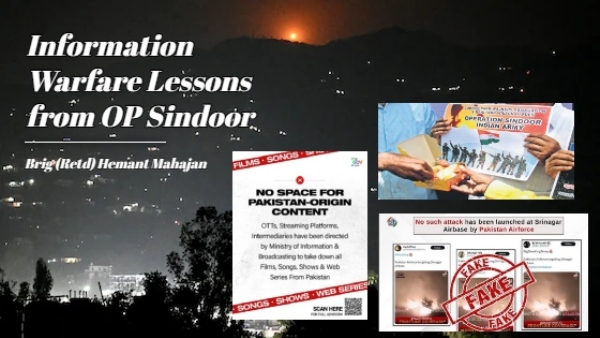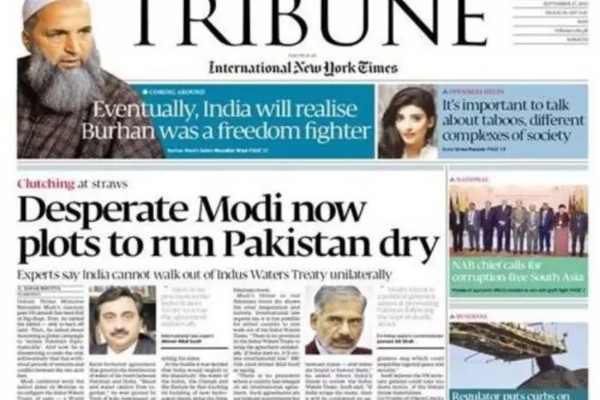Winning Information Warfare: A Major Challenge for India and Our Role as Citizens
Pakistan and China have fully exploited the anti-India or treasonous propaganda circulating in India to win the information war.
Total Views |
'Operation Sindoor' and the Politics of National Interest
War or border operations don't solely rely on military might; their true strength lies in public support and an active citizenry driven by national sentiment. In such situations, maintaining national unity is paramount. Even as 1.4 billion Indians stood united behind the Indian Army, some opposition members questioned the Pahalgam terrorist attack. Some took the stance that "terrorists dId't ask for religion before shooting."

India successfully carried out 'Operation Sindoor' by destroying nine terrorist hideouts. Over 100 terrorists were killed in this operation. India effectively retaliated against missiles and drones launched by Pakistan, causing significant damage to Pakistani airbases and ammunition depots. This forced Pakistan to relent, requesting a ceasefire from India, which was granted.
Some desired an India-Pakistan war, with many demanding the return of Pakistan-occupied Kashmir. However, some made outlandish statements like "the country is celebrating a victory in a war it didn't win." Pakistan even published a detailed list of its own losses. India's objective was achieved, but the opposition, whose aim for an India-Pakistan war wasn't fulfilled, lambasted the central government.
Political Criticism on National Interest: Some Questions
While the Indian government decided to send all-party delegations worldwide, some political parties demand "proof and transparency." At least all-party unity is expected on matters of national interest.
Many ask how many planes we lost, but they never ask how many Pakistani planes the Indian Army shot down or how many airports it destroyed in this war.
Regarding the Pahalgam terrorist attack, some said, "this incident happened to make brothers fight among themselves." They should clarify who these "brothers" are. For how long do we have to be fodder for these terrorist 'brothers'? Terrorists killed 26 Hindus, simply because they were Hindu. They even made men lower their pants to check if they were Muslim. Yet, some leaders said, "Do terrorists have so much time to ask for someone's religion before killing?" This implies that the Hindu victim families of the terrorist attack are lying. Why this attempt to declare victims as liars and claim that terrorists were not 'religious fanatics'? On the other hand, one chief minister expressed the opinion that there should be no war with Pakistan. Why such sympathy for Pakistan?
Furthermore, some claimed that the terrorists didn't touch the women. Should we be grateful that terrorists didn't kill women, but only Hindu men? Can some political leaders make such statements for electoral gain? This incident, however, proved that the enemy of the nation is not just across the border, but also lurking within India. What to do about these poisonous snakes in society, politics, and the media who openly or covertly support the nation's enemies? This is the crucial question.
Internal Enemies and the Need for Strict Action
Strict action is now imperative against those who incite civil war both outside and inside the borders. These traitors must be crushed.
Our Role as Citizens
Pakistan and China have fully exploited the anti-India or treasonous propaganda circulating in India to win the information war. In a press briefing, the spokesperson of the Pakistani army showed a video to all international media. In this video, a famous Indian journalist, Mr. Karan Thapar, was interviewing the former Governor of Kashmir, Mr. Satya Pal Malik. In this interview, Mr. Satya Pal Malik stated that the CRPF jawans in Pulwama were not killed by Pakistani terrorists, but by India itself, and false accusations were made against Pakistan. Since Satya Pal Malik was the Governor of Kashmir when the Pulwama attack occurred, his statements are given importance.
Pakistan showed videos of more than a hundred Indians to international media, in which these Indians were using anti-India language and speaking on behalf of Pakistan. In short, these Indians were acting as spokespersons for Pakistan in front of the international media and proving that the information provided by India or Indian spokespersons was incorrect and what Pakistan was saying was right.
Pakistan's 'Psychological Victory'
Did Pakistan achieve a significant psychological victory in this war? Pakistan shifted the world's attention away from terrorism/terrorist attacks and focused on the narrative that India could not protect its citizens in Kashmir, that Pakistan had inflicted significant military damage on India, that India was defeated in the war, and that the Pakistani army performed better.

As a result, articles and editorials written by the Western media were mostly against India and in favour of Pakistan. In fact, the Western media should have supported India because India is a democratic nation, but they endorsed the views of Pakistan, which is under the control of the Pakistani army. The Western media fully utilized the anti-national statements made by Indians within India to form such opinions.
In short, it can be said that India lagged considerably in the information war or psychological warfare. The Indian public must decide what action should be taken against those within the country who helped Pakistan win this psychological war.
Measures to Curb Anti-National Propaganda
It is also essential to identify and take action against many journalists from foreign newspapers who write against India. For example, they can be boycotted in India. Their visas to enter India can be stopped. Moreover, the newspapers they write for can also be boycotted or blocked within India.
Even though 'Operation Sindoor' ended many days ago, this propaganda war, malicious propaganda war, or psychological war is still ongoing.
Our Responsibility as Citizens: Become an Information Warrior!
In such a war, patriotic citizens can play an extremely important role. Whenever something is said or written against India in foreign social media, print media, or electronic media, it is necessary to immediately respond in that respective media. For example, if the New York Times writes an anti-India article, an email should be sent to the New York Times refuting the information in that article and showing them that their written articles are completely wrong. The reach of international media is immense. Therefore, it is extremely important for every educated Indian to become an information warrior and monitor such anti-India writings and counter them.
Are we ready to fulfil this responsibility?
'Operation Sindoor': A Decisive Message
'Operation Sindoor' was not just a military operation. It was a decisive warning to terrorists, Pakistan, and the anti-national forces operating within the country. India is no longer a nation that merely reacts; it is emerging globally as a country that makes decisive decisions, maintains credibility, and acts responsibly. This success was not achieved overnight; it is the culmination of a decade of foresight, resolve, and continuous efforts. To sustain this success, coming together at political, social, and ideological levels with the spirit of 'Nation First' is the need of the hour. Traitorous forces must be crushed.
--


